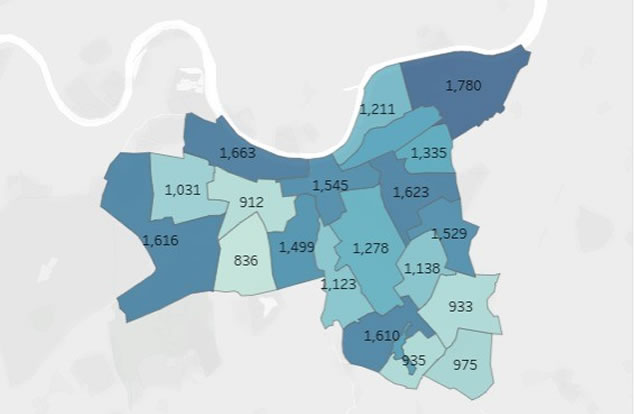Which are the Most and Least Dangerous Areas in Wandsworth?
The borough's wards ranked by number of offences over a year

Wandsworth remains one of the safest boroughs in London, but serious crime still occurs. Queenstown ward, in the north, includes both the new Battersea Power Station development as well as some of the most deprived areas in the borough.
In the year August 2018 to August 2019 it also saw the largest number of crimes in the borough, totalling 1,780 offences.
This included 56 drug offences, 19 possession of weapons offences and 46 sexual offences, topping the list of areas for the number of weapons possession offences in Wandsworth.
This was closely followed by
Thamesfield, which sits further west on the river, saw the second highest number of crimes in the period.
There were 1,663 offences in the last year, including 35 drug offences, 8 possession of weapons offences and 21 sexual offences.
Fairfield saw the most drugs offences, with 96 in the period, closely followed by Latchmere on 84 and Southfields and St Mary’s Park with 63 each.
Tooting had the highest number of sexual offences, with 60 reported in the period and this was followed by 53 in Roehampton and Putney Heath and 52 in West Hill.
There is a bit of a north-south split.
West Hill on the south-western border only had 836 offences in the time period, making it the safest ward in the borough. Although it did have an unusually high number of sexual offences at 52.
East Putney and Bedford also saw lower crime numbers, with 912 and 933 offences respectively.
Simon Crew, Inspector at Wandsworth Neighbourhood Team, said: “There are several factors to consider such as the numbers of people within the ward (both as residents and visitors/commuters) as well as the geographical location and dynamics of the ward.
He continued: “For example, Northcote ward shares part of its boundary with Lambeth on Wandsworth Common, has a number of retail and licensed premises and is also home to Clapham Junction railway station resulting in a significant footfall through the ward seven days a week. I would therefore expect to see a disparity between the number of incidents reported here as opposed to West Hill.
He added: “The nature of these statistics is that when we find a weapon or drugs this is recorded as a crime and therefore the more we find, the higher the crime stat becomes. Through the use of various tactics such as stop and search, weapon sweeps and the execution of search warrants, the police have been able to remove harmful weapons and drugs from the streets and seek convictions for those using them in order to protect our local communities.”
Here’s a list of the most and least dangerous wards in the borough based on the total number of crimes in the period.
Queenstown (1,780 offences)
Thamesfield (1,663 offences)
Northcote (1,623 offences)
Roehampton and Putney Heath (1,616 offences)
Tooting (1,610 offences)
Fairfield (1,545 offences)
Balham (1,529 offences)
Southfields (1,499 offences)
Tooting Town Centre (1,411 offences)
Latchmere (1,372 offences)
Shaftesbury (1,335 offences)
Wandsworth Common (1,278 offences)
St Mary’s Park (1,211 offences)
Nightingale (1,138 offences)
Earlsfield (1,113 offences)
West Putney (1,031 offences)
Furzedown (975 offences)
Graveney (935 offences)
Bedford (933 offences)
East Putney (912 offences)
West Hill (836 offences)
Sian Bayley - Local Democracy Reporter
October 22, 2019
Related links
|